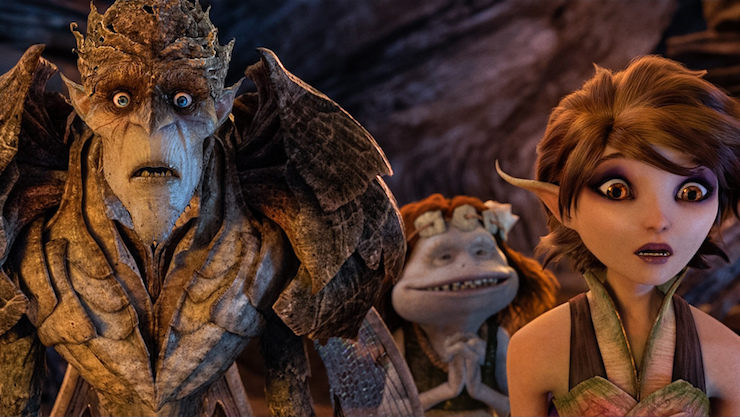There are plenty of family films out there to watch, from brand-new blockbusters to time-honoured classics. But this month marks the three-year anniversary of one film that is likely to be overlooked but really shouldn’t be: Strange Magic. Only recently added to Netflix’s catalogue here in the UK, it is a story which examines love and true inner beauty, and provides a truly valuable message—one that’s conspicuously lacking in so many other family films.
Rotten Tomatoes (which gives Strange Magic a measly 3.8 out of 10) describes the film, based on a story by George Lucas, as “a madcap fairy musical inspired by ‘A Midsummer Night’s Dream’.” Reviews vary from “hated it, what is this rubbish from Disney?” to “I loved it! My kids thought it was great.” Many people seemed to take issue with the style of the characters, finding them unnatural and off-putting, but after decades of Disney princesses boasting impossibly thin waists and unnaturally large eyes, that seems an unfair criticism to level at a kids’ movie.
Animation aside, a consistent accusation levelled at this movie is that it’s just a barrage of karaoke. We are treated to covers of songs from artists as varied as Lady Gaga and Bob Marley to Burt Bacharach and Elvis Presley—some carried off brilliantly, some distinctly lacking in sparkle. Yet a well-deserved nod must be given to Alan Cumming for his vocal work in the film. Disney aficionados will know that even the gravelly Jeremy Irons threw out his voice when singing “Be Prepared” for The Lion King. With that in mind, Cumming’s spectacularly deep but powerful rendition of Deep Purple’s “Mistreated” is even more impressive.
Sure, the film has plenty of flaws that might make adults and even some children cringe, but the complaints levelled against it are nothing new or particularly egregious for a film aimed at children. And while the visual effects are not spectacular compared to some of Lucasfilm’s other productions, the two contrasting environments of the Enchanted Kingdom and the Dark Forest are rendered with care, and the latter in particular has a subtle charm to it.
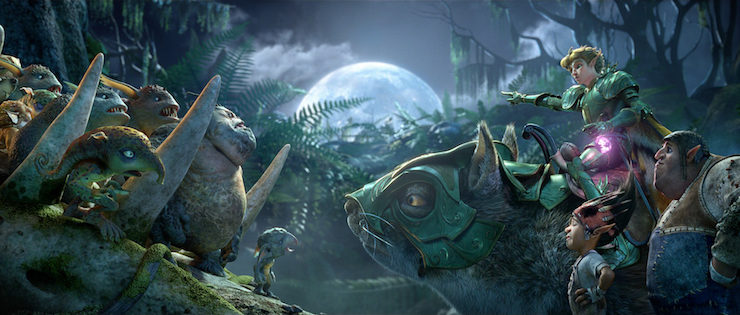
The plot is familiar enough. In the Enchanted Kingdom, there are two fairy princesses: the elder, Marianne, and the younger, Dawn. Marianne is set to marry the handsome fairy soldier, Roland. But when she finds him cheating on her, she swears off love completely and chooses to become a lone warrior, defending her realm. Lucas has said that he wanted this film to be an inspiration for young girls, and in Marianne he has given us a strong, independent character who nevertheless maintains her caring attitude. Online parental reviews seem to indicate that Lucas has indeed won the hearts of many young female viewers. Certainly my own daughter frequently roleplays as Marianne, both singing her songs and mimicking her fights.
The other kingdom in this fantastical world is the Dark Forest, ruled over by the Bog King. Having failed to find love himself, the Bog King has banned love within his kingdom and imprisoned the Sugar Plum Fairy, the only creature who can make love potions. When someone steals a love potion from under the Bog King’s nose, he snatches Marianne’s younger sister, Dawn, and decrees that he’ll only give her back in return for the potion, which he plans to destroy. From this point on ensues fighting, banter, various people falling in love—and, of course, plenty of singing.
The central love story is that between Marianne and the Bog King. Marianne’s attempted rescue of her sister brings the two of them into close conflict—yet even as they fight, they come to realise they have more in common than they ever imagined. When we learn the true story of why the Bog King couldn’t find love, it paves the way for the moment we all saw coming—the Bog King and Marianne getting together.
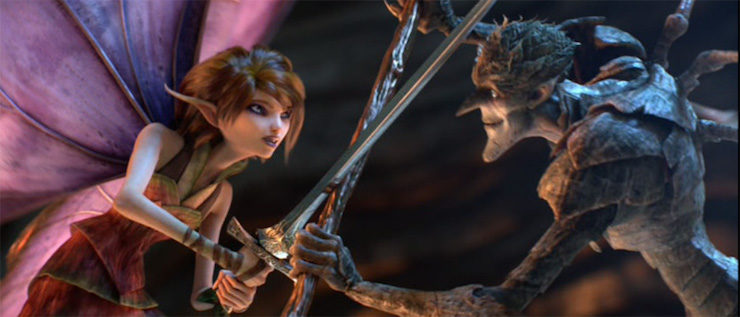
As well as the main romance, there are two additional subplots within this film that deal with the idea of true love and false love. Firstly, there’s the potion itself. Roland has duped Sunny, a good-natured elf who is in love with Dawn, to steal it in an effort to help them both win the two princesses. However, the potion falls into the paws of a fuzzy imp (filling the role of the obligatory cute and comic creature—there’s one in every Lucas film), who then proceeds to dust every being it encounters with the magic potion. The ensuing chaos carries a serious point within its comedy: love created by this superficial means is not natural or pretty, and only ends up in unhappiness.
Secondly, there is the blossoming romance between Sunny and Dawn. It begins with Sunny’s unrequited love, follows Dawn’s accidental dusting with love potion (which results in her falling for the Bog King), and concludes with Dawn’s realisation that her best friend is the only one who loves her just for herself, and not because she’s a princess. So, despite their differences in size, shape, and skin colour, these two characters achieve their own happily ever after.
None of this is particularly unusual in a kids’ film, of course—but what really sets Strange Magic apart from the rest is the last ten minutes or so. The concept of the heroine falling for the “ugly” anti-hero is nothing new. We need only look at firm favourites like Beauty and the Beast or Shrek to see that this has been done before, and done well. But ultimately what earns Strange Magic its place among the greats is how it deals with skin-deep beauty and true love.
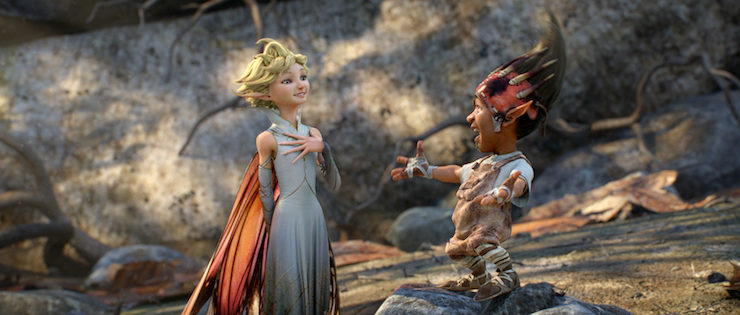
In most retellings of Beauty and the Beast, including the Disney versions of the story, Belle sees through the Beast’s terrible exterior to the redeemable man within. Her love breaks the spell upon him and reveals a handsome prince. Shrek updated this concept for a modern audience: instead of the hero becoming a handsome human, the heroine becomes an ogre. After years of impossibly waif-like Disney princesses, it was refreshing for a film to show that it was not only people who conform to strictly defined and largely unrealistic standards of beauty who get to live happily ever after. Shrek 2 expanded on this idea by showing that, even when given a chance for her and her husband to be conventionally beautiful, Fiona remained true to what mattered—and that wasn’t her looks.
However, if we consider Shrek from another angle, it’s still perpetuating the idea that only people of relative attractiveness can or should be together. You can’t have someone traditionally seen as “ugly” living happily ever after with someone considered “beautiful.”
And this is where Strange Magic leaps the final gap. At the end of the movie, the Bog King is not outwardly transformed by Marianne’s love for him; his appearance isn’t changed by any magic spell. Instead, both Marianne and the Bog King maintain their looks and their love. The message in Strange Magic is one that movies like Shrek fall short of presenting: that differences in outward physical appearances really are irrelevant—a fairy can fall in love with a creature that looks like a cross between a grasshopper and a praying mantis, and no magic spell is needed to make that love any more acceptable, convincing, or real.
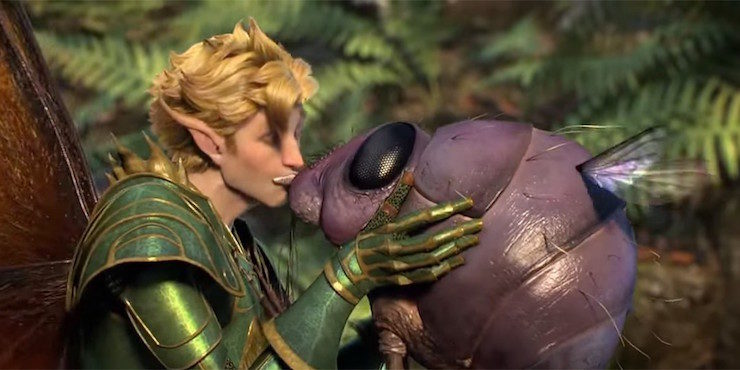
When George Lucas said: “Everyone deserves to be loved, and they deserved to be loved no matter what they are, or what they look like,” in discussing this film, he truly meant it. Strange Magic is the result of this philosophy, and expresses it wholeheartedly. For that reason, despite being a complete flop at the box office and given virtually no marketing from the Disney or Touchstone team, this film really deserves some reconsideration, and should be counted as a cult classic that children and families might discover and judge for themselves for years to come.
Charlotte is an author, ghostwriter, freelance editor and reviewer for both Ginger Nuts of Horror and the BFS. She also co-hosts the podcast, Breaking the Glass Slipper, which is available on iTunes and Soundcloud. You can find out more about her at: www.charlottebond.co.uk










